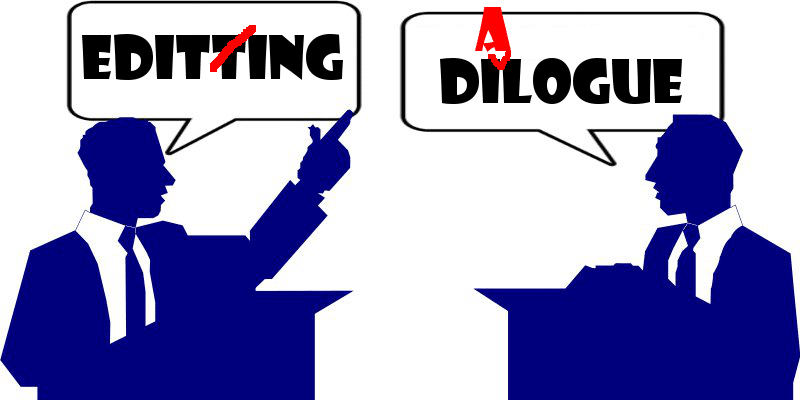I have written characters that speak like kings and professors. Perfect diction. Perfect use of vocabulary. Perfect grammar. This is fine for characters who are kings, professors, or anyone else whose education, breeding, and social status demand such technically correct speech. But these characters are the exception, not the rule. Real people mangle language when they talk. A dinner table conversation at a restaurant, copied down verbatim, could wind up unintelligible in print. Speakers talk over one another. They misspeak. There are references to earlier conversations or individuals not present, all without context. Pronoun use and modifiers rely on the listener’s knowledge to make sense. Slang, jargon, misused words, and mispronunciations garble sentences.
You just can’t write that.
Well, you could write that, but you shouldn’t.
What you need to do as a writer is to convey the sense of a real conversation, but not simulate one. But you have an unexpected adversary in this: your editor!
Editors are the heart and soul of civilized writing. They are the thin red line between literature and Twitter. Without them, many books would read like YouTube comments. But by the same token, they bristle at realistic dialogue. Most of them (in my experience) do understand the need for people to speak differently from narrative prose. But with every redacted improper contraction, every insertion of an article you or I would omit in casual conversation, you can sense their reluctance.
Here’s the balance I’ve tried to strike.
- Use pronouns properly. Even if a character feels like they should be spouting off a long diatribe of “hes” and “shes,” mix in the requisite number of proper nouns to be clear what refers to what.
- Limit clipped speech. I’ll use “’em” and end “-ing” words with “-in’,” but I try not to take it beyond that.
- Accept that I shouldn’t use comma splices. I fix them to at least a semi-colon when my editor catches them.
- Spell words properly unless making a point of a misuse or mispronunciation by a character. I’ll often call attention to it in the narration.
- I push back on sloppy grammar. If I can read it out loud and it sounds natural, I don’t care if it is technically wrong. Characters are saying this, and they don’t have an editor.
- When in doubt, just accept the proposed change. My stance is that I need a reason not to implement an editorial change.
- Sometimes I will fix a highlighted problem differently than suggested. This is particularly true when I’ve botched something so badly that the original intent wasn’t clear, and the proposed change would carry a different meaning. Editors aren’t mind readers; they can only work with what you’ve given them–which occasionally happens to be gibberish.
Not every editor is going to be out to completely sanitize your dialogue. Not every bit of edgy, true-to-life dialogue you’ve written should appear untouched in final form. Just be sure to read editorial changes to your dialogue with a critical eye. If you’ve done something technical wrong that only appears to the reader (punctuation is a good example), please do your readers a favor and fix it. If you’re using improper words and sloppy grammar to convey character, you can feel justified sticking to your guns.


0 Comments